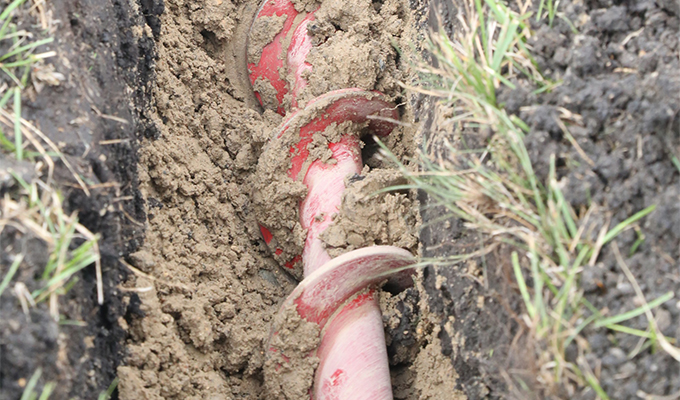By Mike Hale
A contractor’s resources are limited. Time, energy, and money are all in high demand. Every job a contractor decides to take on burns these resources. So, it only makes sense to look for equipment that’s going to make completing jobs faster, easier, and less expensive. This usually comes from selecting the right equipment with a key feature being versatility.
Some earth drills offer additional attachments to expand applications beyond traditional boring. Simply adding a horizontal boring attachment to a drill offers the ability to bore under paved surfaces to install conduit or pipe, connect a water line for a sprinkler system, or run wiring for outdoor lighting. These simple attachments allow contractors to replace work once done by hand with a faster, easier, and more profitable method.
FOUR WAYS TO BORE
Depending on the size of the project, there are four main ways to bore under a paved surface. The simplest, but hardest, involves physically forcing a pipe through the ground with a sledgehammer and raw muscle power.
Directional drills, in comparison, take some of the labor out of horizontal boring. These drills are best used in bigger projects that require installing pipe or cable for distances more than 100 feet. This size of project and drill requires a small team to safely maneuver the drill and get the job done. Costing more than $90,000 and weighing at least 3,000 pounds, directional drills can be difficult for many to buy and maneuver.
A third option is to use moles, which bore under highways and larger paved surfaces. Compared to directional drills, these machines are smaller and less expensive, but are still costly to buy or rent. Moles usually take two or more people to operate, in addition to multiple steps and pieces, making them a hassle for a small project.
Some manufacturers offer attachments that connect to mechanical or standard hydraulic earth drills. The attachments take on smaller projects, such as boring under sidewalks and driveways, and are easy for one person to operate. Besides being easier to operate than the other methods, the cost of a horizontal boring kit, approximately $350, is considerably lower than any alternative. Most contractors don’t need to worry about extra equipment expenses when all they need is the drill and kit.
Another benefit of these attachments is that they’re lightweight and easy to maneuver. This makes them ideal for use in residential areas, enabling operators to install underground sprinkler systems and run lighting in half the time and with less effort compared to using a sledgehammer to drive the pipe under the pavement.
TWO ATTACHMENT STYLES
Many mechanical and standard hydraulic drills on the market do not have the option to add a horizontal boring attachment, so it’s important to look for an earth drill with the necessary features to ensure it will handle the application. The main component required to transition a drill from vertical to horizontal drilling is a flexible drive shaft. This allows the operator to reach the desired angle for horizontal boring.
Once you know your drill can handle the job, it’s time to choose the attachment. Analyze the project’s purpose, size, and timeline. When drilling shorter distances, such as under a sidewalk, a dry drilling kit can bore 4 feet in less than a minute. For distances up to 50 feet, choose a wet boring kit. A wet drill kit can bore under a 30-foot driveway in as little as 10 to 15 minutes. Both dry and wet boring attachments are lightweight and easy to use.
CLOSING THOUGHT
Using resources carefully makes all the difference in completing boring projects efficiently and safely, while remaining mindful of costs. When it comes to smaller projects, the fastest, safest, and cheapest method to bore under pavement may simply be adding an attachment to existing equipment.
About the Author
Mike Hale started his career in the fencing industry in 1974, and in 1996, began working at Little Beaver Inc., a leading manufacturer of portable earth drills and accessories. He continues to offer expertise on fencing and hole digging equipment as the sales manager. If you have questions or comments, contact Mike at mikeh@littlebeaver.com or call 800.227.7515. Little Beaver effectively serves the needs of end-users from professional contractors to rental centers. For more, visit www.littlebeaver.com.


